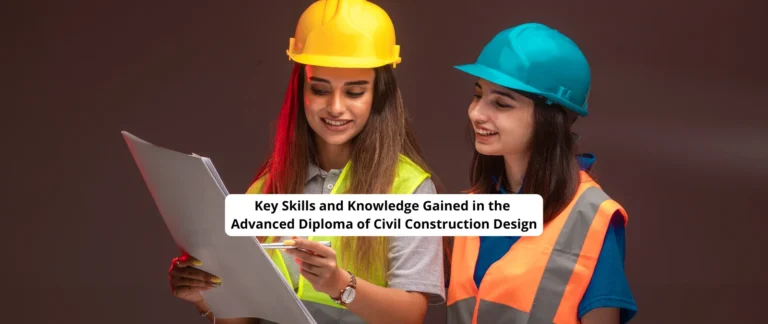The world of civil construction is a mesmerizing symphony of concrete, steel, and human ingenuity. If you’re drawn to the power of shaping infrastructure, transforming landscapes, and leaving your mark on the built environment, then a Diploma in Civil Construction Design might be the perfect stepping stone to your dream career. However, the journey from aspiring builder to confident designer can be challenging, so having the right tools and strategies in your toolbox is crucial.
Embarking on a journey to pursue a Diploma in Civil Construction Design is a commendable decision that opens the doors to a dynamic and rewarding career. However, mastering the intricacies of this field requires dedication, strategic planning, and the implementation of effective study techniques. In this blog, we will explore valuable tips and tactics to ensure your success in the pursuit of a Diploma in Civil Construction Design.
This blog dives deep into the practical tips and tactics to help you navigate your Diploma in Civil Construction Design course with confidence and excel in your studies. Get ready to:
Lay the Foundation Strong
Begin by thoroughly understanding the course curriculum. Civil construction design programs are designed to cover a wide array of subjects, from structural engineering to project management. Create a roadmap of the modules and prioritize topics based on their relevance and complexity. This will help you allocate your time and resources efficiently.
- Math Matters: Don’t underestimate the importance of a solid foundation in mathematics. Geometry, trigonometry, and calculus will be your constant companions throughout the course, so brush up on these concepts and invest in practice problems.
- Befriend Physics: Understanding the laws of physics governing forces, stresses, and material properties is essential for sound design. Embrace physics as a friend, not a foe, and seek help from tutors or online resources if needed.
- Software Savvy: The construction industry relies heavily on specialized software for drafting, 3D modelling, and structural analysis. Familiarize yourself with popular software like AutoCAD, Revit, and STAAD.Pro early on and practice regularly to gain proficiency.
Master the Blueprint
- Course Cravings: Devour your course materials! Textbooks, manuals, and lecture notes are your treasure trove of knowledge. Highlight key points, take detailed notes, and actively engage in class discussions to deepen your understanding.
- Field Trip Frenzy: Don’t just learn about construction, see it in action! Participate in field trips to construction sites, observe different stages of development, and ask questions to bridge the gap between theory and practice.
- Group Gains: Teamwork makes the dream work, especially in design! Form study groups with classmates, discuss complex concepts and share the workload. Collaborative learning can be incredibly rewarding and insightful.
Hone Your Design Skills
- Sketch Savvy: Before the computer takes over, master the art of hand-drawn sketches. Learn basic drafting techniques, visualize structures in different dimensions, and practice conveying your ideas on paper.
- Think in 3D: Develop your spatial reasoning skills. Train your brain to visualize structures in three dimensions, understand how components interact, and anticipate potential challenges in your designs.
- Software Symphony: Mastering construction software will open doors to creative exploration and precise execution. Don’t be afraid to experiment with different features, push the boundaries of your designs, and seek feedback from instructors and peers.
Beyond the Books
- Industry Immersion: Networking is key! Attend industry events, connect with professionals, and seek internship opportunities. Gaining real-world experience will not only enrich your studies but also build your professional network.
- Communication Connoisseur: Construction is a collaborative effort. Hone your communication skills to convey your ideas clearly and concisely to engineers, contractors, and clients. Written and verbal communication are equally important for success in this field.
- Lifelong Learner: Embrace continuous learning! Technology and construction practices evolve rapidly. Keep yourself updated with the latest trends, attend relevant workshops, and never stop expanding your knowledge base.
Building Resilience
- Mental Marathon: Remember, this is a marathon, not a sprint. There will be challenging assignments, tough concepts, and moments of self-doubt. Stay focused, persevere through difficulties, and celebrate your wins, big and small.
- Time Management Maestro: Juggling classes, assignments, and personal life can be overwhelming. Develop effective time management skills, prioritize tasks, and learn to say no when needed. A healthy balance is crucial for maintaining good physical and mental health.
- Support System Symphony: Surround yourself with a strong support system. Lean on family, friends, and faculty for encouragement, guidance, and a shoulder to cry on when things get tough. Remember, you’re not alone in this journey.
Effective Time Management
Time is a precious resource, especially when pursuing a diploma program. Develop a study schedule that accommodates your personal and professional commitments. Break down your study sessions into manageable intervals, allowing for focused and productive learning. Consider using time management tools and techniques to enhance your efficiency.
Stay Updated with Industry Trends
The field of civil construction design is constantly evolving. Stay abreast of the latest industry trends, technological advancements, and construction methodologies. Subscribe to industry publications, attend seminars, and engage with professionals to gain insights into the current state of the field. This knowledge will not only enrich your learning experience but also make you more marketable in the job market.
Develop Strong Analytical Skills
Civil construction design involves critical thinking and problem-solving. Hone your analytical skills by tackling complex design problems and projects. Work on developing a systematic approach to problem-solving, breaking down issues into manageable components. This skill set will prove invaluable in both your coursework and future professional endeavours.
Networking
Build a strong professional network within the construction industry. Attend industry events, join professional organizations, and connect with alumni. Networking provides opportunities to gain insights, access job opportunities, and seek mentorship from experienced professionals.
Effective Communication
Effective communication is a cornerstone of success in any field. Develop strong written and verbal communication skills. Practice conveying technical information clearly and concisely. This will not only aid in your coursework but also enhance your ability to collaborate with interdisciplinary teams in the workplace.
Continuous Revision
Civil construction design is a cumulative field, with later concepts building upon earlier ones. Regularly revise and review previously learned material to reinforce your understanding. Create summary notes, flashcards, or mind maps to aid in quick revision before exams.
Seek Feedback
Don’t be afraid to seek feedback on your work. Constructive criticism is a valuable tool for improvement. Whether it’s from professors, peers, or industry professionals, use feedback to identify areas for growth and refinement in your design approach.
Here are also some bonus tips for you to conquer the realm of Civil Construction design.
Bonus Tips:
- Curiosity is Key: Fuel your learning with a genuine curiosity about the world around you. Ask questions, explore different aspects of construction, and connect what you learn in class to real-world problems.
- Embrace Feedback: Feedback is a gift, not a criticism. Analyze feedback constructively, use it to identify areas for improvement, and strive to do better each time.
- Find Your Passion: Discover what you truly enjoy within the vast field of civil construction design. Is it structural engineering, sustainable design, or urban planning? Finding your passion will add fuel to your fire and keep you motivated throughout your studies.
Remember, your Diploma in Civil Construction Design is an investment in your future.




